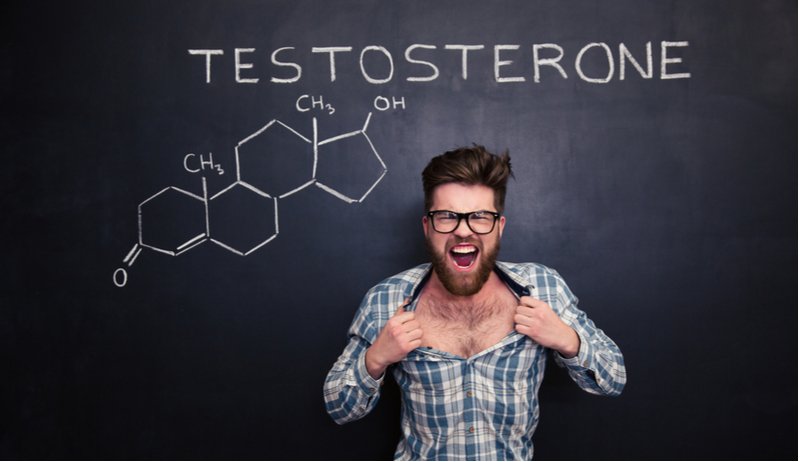If it’s socially egregious to suggest that females are slaves to their hormones, then shouldn’t the same expectation apply to males?

I made a big dietary lifestyle change four years ago in an effort to be more healthy. After testing prevailing theories and monitoring endless biomarkers and micronutrient levels I lost fifty plus pounds and improved every measurable marker immensely but one stood out. At 46 years old, my testosterone level rose to was that of a virile 19-year-old. After quickly and proudly posting these results to social media it occurred to me that although my blood showed a hormone historically associated with aggression, I had become a pacifist.
This was confusing to me. I believed that testosterone was directly associated with violence but it seemed to have the opposite effect on me. Are we not the slaves to our hormones some may have us believe? Further, if it’s socially egregious to suggest that women are slaves to their hormones, then shouldn’t the same expectation apply to men? I was not always anti-violence. In fact, I loved fighting. I boxed for over a decade and even co-owned a boxing club. I forged close friendships over stiff jabs to the face (mostly received) and my personal favorite, hooks to the body (mostly delivered).
To share what may be confounding data and to give a bit more context on my testosterone climbing timeline, I also overcame a four-year struggle with drugs and alcohol after a repressed memory of a childhood trauma surfaced, about which I wrote a book. This may have had an impact on my unwillingness to strike a heavy bag but I don’t feel that it explains it completely. I needed to take a closer look.
***
What is the role of testosterone?
According to Harvard Health, testosterone plays an important role in:
- The development of the penis and testes
- The deepening of the voice during puberty
- The appearance of facial and pubic hair starting at puberty; later in life, it may play a role in balding
- Muscle size and strength
- Bone growth and strength
- Sex drive (libido)
- Sperm production
- Also produced in and a requirement of ovaries
Any mention of aggression is conspicuously absent even in the section entitled “The Perils of Too Much Testosterone”.
What are people saying?
In my very unscientific social media poll, 9 of the 20 (45%) respondents associated testosterone with “causes aggression” which placed third behind “increases strength” (95%) and “increases libido” (60%). The belief that testosterone makes men predisposed to violence very much exists. Heralded academic literature leans on this idea to defend rape. In his book A Natural History of Rape: Biological Bases of Sexual Coercion, entomologist and evolutionary biologist Randy Thornbill claims that men have “adapted to rape women because the potential reward of reproduction is worth more than the cost of harm to the victim”. Liz Plank, author of For the Love of Men: A New Vision for Modern Masculinity is quick to point out that “Thornhill fails to account for men who rape other men, as well as the many male victims who are sexually assaulted by women.” Point Plank.
What does the data say?
A 2016 meta-analysis concluded that sex offenders do not have higher levels of testosterone than the regular population and neither do men who become violent with their partners. There is also no difference in testosterone in aggressive and passive prisoners. What about men who inject themselves with testosterone for various therapies? In a published article in The Journal of Clinical Endocrinology & Metabolism states that “there are few empirical data on the influence of therapeutic doses of T[estosterone] on male aggressive behavior.”
In a 2002 clinical trial by the NIH entitled Exogenous Testosterone, Aggression, and Mood, otherwise healthy participants were given 200 mg im T weekly for 8 weeks found that “[n]o significant changes in aggression or mood levels were found.” The data seem to refute the myth that testosterone is a cause or even a precursor to violence. In a fascinating exercise, researchers at Knox College asked men to hold a gun and others to hold a game of Mouse Trap. The testosterone in the gun wielders was one hundred times higher than the board gamers. In other words, testosterone came after violent behavior. What does this mean? Perhaps testosterone is always present during aggression but for different reasons than we once assumed. It seems that a new paradigm surrounding testosterone is emerging.
Higher Social Status
What may be a subtle distinction for some new research from independent researchers at Pennsylvania State University and the University of Cambridge show that men given testosterone were not more physically aggressive but rather more competitive in an effort to achieve higher social status.
In a joint study published in The Proceedings of the National Academy of Sciences, researchers found that participants injected with testosterone and playing a modified game of Ultimatum were more likely to punish players who were playing unfairly while rewarding players through generosity. The resulting published article was titled Testosterone causes both prosocial and antisocial status-enhancing behaviors in human males. In a 2012 German study about the potential hormonal influence of lying, men given a small dose of testosterone were less likely to cheat and more likely to be honest than the control groups. The seems the new paradigm around aggression and testosterone is suggesting a more prosocial behavior rather than violence.
In Sum
A friend recently brought up a quote by Harvard Professor and bestselling author Clayton Christensen I used in my book:
It’s easier to hold to your principles 100 percent of the time than it is to hold to them 98 percent of the time. The boundary—your personal moral line—is powerful because you don’t cross it.
I try to live by this sentiment as it’s my way of achieving a higher social status. My social environment is my family and close friends who I’ve chosen deliberately. Seeking a higher status to me is making my wife happy, my daughters feel loved, and my friends enjoy my company. My higher level of testosterone may very well have helped me be a better husband, father, and friend while reducing my level of aggression.
Contrary to popular, yet seemingly diminishing belief we are not slaves to our hormones. Our agency is our own. We are able to define a personal moral framework and create a social environment conducive to our personal growth. With these in place, not only are we not fighting our biology but our testosterone can help bring out the best in us.
Please Note: It’s important to note that just because we may enjoy several health benefits to testosterone to consume or inject it may have harmful effects. An NIH funded study published in the New England Journal of Medicine our requirements and production of testosterone vary widely among individuals. Taking it is a gamble. My point here is not that testosterone is a panacea, but it’s not the sole cause of aggression.
–
Sources
- For the Love of Men: A New Vision for Modern Masculinity by Liz Plank
- Alan Booth, Douglas A. Granger, Allan Mazur, Katie T. Kivlighan, Testosterone and Social Behavior, Social Forces, Volume 85, Issue 1, September 2006, Pages 167–191, doi:10.1353/sof.2006.0116
- Harvard Health Testosterone — What It Does And Doesn’t Do – July, 2015. https://www.health.harvard.edu/drugs-and-medications/testosterone–what-it-does-and-doesnt-do
O’Connor DB, Archer J, Hair WM, Wu FC. Exogenous testosterone, aggression, and mood in eugonadal and hypogonadal men. Physiol Behav. 2002;75(4):557-566. doi:10.1016/s0031-9384(02)00647-9 - Gonadal steroids and body composition, strength, and sexual function in men. N Engl J Med. 2013 Sep 12;369(11):1011-22. doi:10.1056/NEJMoa1206168. PMID: 24024838.
- Mazur, Allan, et al. “Testosterone and Chess Competition.” Social Psychology Quarterly, vol. 55, no. 1, 1992, pp. 70–77. JSTOR, http://www.jstor.org/stable/2786687. Accessed 23 July 2020.
- Wong JS, Gravel J. Do Sex Offenders Have Higher Levels of Testosterone? Results From a Meta-Analysis. Sex Abuse. 2018;30(2):147-168. doi:10.1177/1079063216637857
- Testosterone causes pro- and antisocial behaviors Jean-Claude Dreher, Simon Dunne, Agnieszka Pazderska, Thomas Frodl, John J. Nolan, John P. O’Doherty PNAS October 11, 2016 113 (41) 11633-11638; first published September 26, 2016 doi:10.1073/pnas.1608085113
***
If you believe in the work we are doing here at The Good Men Project, please support our mission and join us as a Premium Member.
All Premium Members get to view The Good Men Project with NO ADS. Need more info? A complete list of benefits is here.
Talk to you soon.
—
Photo credit: Shutterstock


